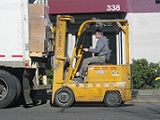Forklift Operator Alleges Retaliation, Defamation
Post Views 2A forklift operator working at a warehouse in Mounds View, Minnesota, was fired for violating various company policies. His response? He sued his former employers for retaliation and a co-worker for defamation.
Back in September of 2008, the plaintiff, who is white, testified on behalf of a black worker whose employment was recently terminated. The company had fired the black employee for repeatedly failing to sign a forklift checkout sheet. The man filed a lawsuit alleging racial discrimination, claiming that other employees likewise did not sign the sheet but had not been similarly disciplined. The plaintiff, along with a couple of other workers, essentially confirmed this claim in depositions. The company subsequently settled with the employee. Afterwards the warehouse general manager spoke to the three workers who had provided testimony and a fourth employee. Two of the men were issued disciplinary warnings, neither of whom were the plaintiff.
A couple of months later, another worker had been authorized to begin and end his shifts one hour early. Some employees questioned the reasons for the shorter shifts, and the plaintiff complained to the general manager, who called the worker into his office. Following the meeting, the man went home and committed suicide.
One of the man’s friends began telling employees that the plaintiff’s complaint was “the straw that broke the camel’s back,” stating that he “was the reason for [the man’s] death.” In the presence of other workers, the plaintiff confronted the employee making the allegations and acted in a hostile manner, bumping into him and challenging the man to strike him. Continued aggressive conduct, witnessed by other workers, led the employee to file a written complaint against the plaintiff.

The district court ruled in favor of the defendants on both counts. On appeal, the plaintiff’s argument for retaliation was that his misconduct was a pretext for his testimony in 2008. The appeals court, however, stated that the man had failed to prove a causal connection between the testimony given and his termination. With respect to the defamation, no one had disputed the comments made against the plaintiff. The court believed that the man’s statements did not express “objectively verifiable facts.” In other words, they were clearly speculation and not intended to be factual or convey the belief that they were fact. Accordingly, the appeals court affirmed the district court’s grant of summary judgment for the company, the general manager and the employee in question.
Forklift Operator Alleges Retaliation, Defamation by Harrison Barnes



 Want to Attract Top Talent to Your Company? Have a Purpose
Want to Attract Top Talent to Your Company? Have a Purpose  Top Trends in Human Resources
Top Trends in Human Resources  When to Visit Human Resources
When to Visit Human Resources  6 Ways to Make Your Employees Happier
6 Ways to Make Your Employees Happier  Want to Be a Great Leader? Learn to Listen
Want to Be a Great Leader? Learn to Listen  Top 4 Most Effective Management Styles & How to Use Them
Top 4 Most Effective Management Styles & How to Use Them  The New Trend of Defamation Lawsuits
The New Trend of Defamation Lawsuits  What’s Lacking in the Work Place
What’s Lacking in the Work Place